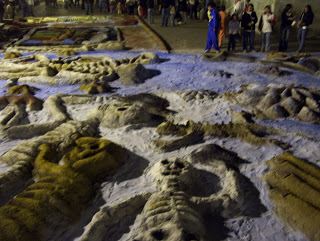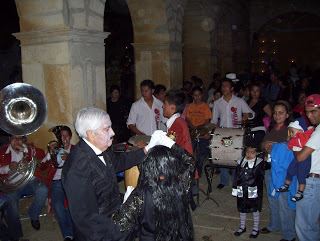 All Spain blogs
All Spain blogs
 Start your own blog
Start your own blog
|
|
|
Day of the Dead
Tuesday, October 30, 2012 @ 2:53 PM
Forget Halloween, it’s just a commercial nonsense. What’s much more interesting is the day after, 1 November. We call it All Saints Day. In Mexico it’s known as the Día de los Muertos, the Day of the Dead.
 If you think that sounds grim, macabre or spooky, you couldn’t be more wrong. The Day of the Dead is a massive communal celebration. Thousands of families visit their local cemeteries and have parties at the gravesides of their dead relatives and ancestors. They build little altars at home, and decorate them with photographs and loved ones’ favourite foods. It’s an event that goes back many hundreds of years, at least to the Aztec era. If you think that sounds grim, macabre or spooky, you couldn’t be more wrong. The Day of the Dead is a massive communal celebration. Thousands of families visit their local cemeteries and have parties at the gravesides of their dead relatives and ancestors. They build little altars at home, and decorate them with photographs and loved ones’ favourite foods. It’s an event that goes back many hundreds of years, at least to the Aztec era.

The biggest and best Mexican celebrations are in Oaxaca. A couple of years ago Sue, Mike and I were there for the festivities. We had a ball! The city cathedral was surrounded by hundreds of huge sand sculptures. The main cemetery was transformed into a place of light, with music and dancing, eating and drinking - bubbling with energy and excitement. It was full of joy.
The nearest we get to this in our buttoned-up western culture is the Irish wake, when family and friends come together to celebrate the life of whoever has just died, often with their body present in the room. There’s plenty to eat and drink, and laughter, with some good stories told. But it’s different, it’s about just one person, and it only happens the one time.
Wouldn’t it be great to remember and celebrate our dead on a regular basis, and do it together? It would reaffirm our sense of who we are and where we belong, and remind us that we’re part of a big supportive community.
Of course we might want to pick and choose a bit about who we’re remembering - there may be some people we are glad to have got away from.
And since many of us move around a lot, we might have to work out the best place to do our celebrating.
For me it would probably be the churchyard in Corbridge, Northumberland, where my father’s buried, near where he and his parents lived for many years. We’d need some big braziers to provide us with heat and light, as it can get pretty cold up there. As well as the food and wine and singing (‘Blaydon Races’ would have to figure), we’d take a football and play a bit of 3-and-in.
Where would you hold your Day of the Dead?
And what would you do to celebrate?
6 Comments
Only registered users can comment on this blog post. Please Sign In or Register now.
|
|
|